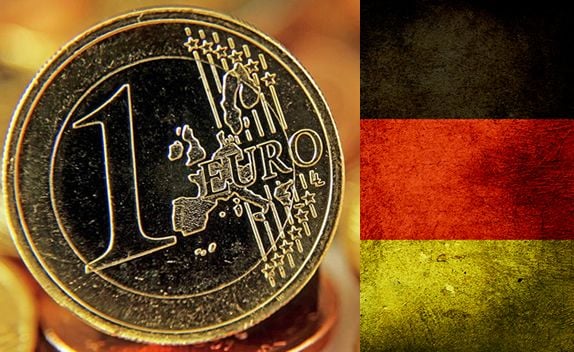Euro Strengthens after German GDP Growth Reaches Six-year High in Third-quarter
- Written by: James Skinner
-

The Euro is stronger after data confirms Germany's economy is growing at an annualised rate of 2.8%, the fastest pace of growth seen in Europe's largest economy since the first quarter of 2011.
The Euro rose during early trading in London Tuesday after official data showed the German economy growing at its fastest pace in more than six years during the third-quarter.
Germany’s economy expanded by 0.8% during the three months to the end of September, up from the 0.6% pace of growth seen in the second quarter and far ahead of the consensus estimate for another 0.6% steady rate of growth.
First quarter growth was also revised higher, from 0.7% to 0.9%, according to the report by federal statistics office, Destatis.
An increase in business investment, particularly in machinery and equipment, was the chief driver behind the boost. Government and household spending were stable during the recent quarter according to the federal statistics office, Destatis.
“The increase was sharper than the consensus forecast and our own of a 0.6% rise and far better than the message from timelier hard data,” says Jennifer McKeown, chief European economist at Capital Economics.
Tuesday’s figure leaves the German economy growing at an annualised rate of 2.8%, the fastest pace of growth seen in the central European country since the first quarter of 2011.
“Looking ahead, prospects for Germany seem particularly bright, with industrial and consumer sentiment at high levels and unemployment historically low. However, the upturn is still not creating much inflationary pressure,” says McKeown.
Germany’s final inflation number was released Tuesday, the second in a two-part series of monthly price estimates, which showed price pressures missing in action during October.
Headline consumer price growth came in at 0.0% for October, unchanged from the previous month, while the annual pace of German inflation remains a way below target at 1.5%.
“This was partly due to a sharp drop in the volatile package holidays component. But with wages growth still pretty subdued, we doubt that the strength of the German economy will cause the ECB to alter its plan to keep buying assets throughout 2018,” Mckeown adds.
Absent a disappointing GDP number from either Italy or the Netherlands Tuesday, Germany’s data creates scope for the third-quarter’s broader Eurozone number to be revised upward from its preliminary estimate, according to McKeown.
That said, the low level of inflation pressure in even Germany, the Eurozone’s economic engine room, could vindicate European Central Bank policymakers for their decision in October to continue buying European government bonds well into 2018.
The ECB said at its last meeting it will reduce the value of its bond purchases from €60 billion per month down to just €30 billion but continue the program until September 2018 “or beyond”. Markets had initially begun to hope the ECB would bow out from the bond market in September.
The Euro was quoted 0.23% higher at 1.1690 against the Dollar during early trading in London Tuesday. The Euro-to-Pound rate rose 0.42% to 0.8926, making for a Pound-to-Euro rate of 1.1204, which is down 0.42% on the session.
Get up to 5% more foreign exchange by using a specialist provider by getting closer to the real market rate and avoid the gaping spreads charged by your bank for international payments. Learn more here.
